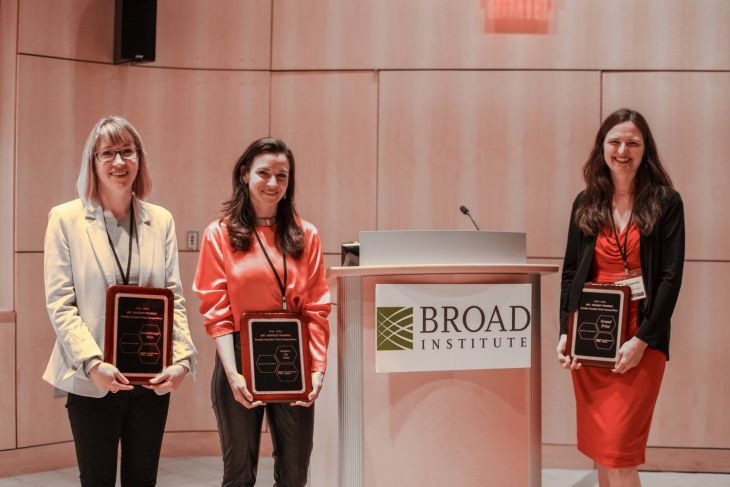“They have taken the first brave step of getting off the bench when they already work seven days a week. They have carved out time from their facilities, from their labs, from their lives in order to put themselves out there and leap into entrepreneurship,” Hickey says. “They’ve done it because they each want to see their innovations out in the world improving patients’ lives.”
MIT Faculty Founder Initiative Executive Director Kit Hickey MBA ’13 describes the time and hard work the three awardees and other finalists devoted to the initiative and its mission of cultivating female faculty in biotech to cross the chasm between laboratory research and its clinical application.
Patients with intractable cancers, chronic pain sufferers, and people who depend on battery-powered medical implants may all benefit from the ideas presented at the 2023-24 MIT-Royalty Pharma Prize Competition’s recent awards. This year’s top prizes went to researchers and biotech entrepreneurs Anne Carpenter, Frederike Petzschner, and Betar Gallant ’08, SM ’10, PhD ’13.
Carpenter, senior director of the Imaging Platform at the Broad Institute of MIT and Harvard, where she is also an institute scientist, won the competition’s $250,000 2023-24 MIT-Royalty Pharma Faculty Founder Prize Competition Grand Prize. Carpenter specializes in using microscopy imaging of cells and computational methods such as machine learning to accelerate the identification of chemical compounds with therapeutic potential to, for instance, shrink tumors. The identified compounds are then tested in biological assays that model the tumor ecosystem to see how the compounds would perform on actual tumors.
Carpenter’s startup, SyzOnc, launched in April, a feat Carpenter associates with the assistance provided by the MIT Faculty Founder Initiative. Participants in the program receive mentorship, stipends, and advice from industry experts, as well as help with incorporating, assembling a management team, fundraising, and intellectual property strategy.
“The program offered key insights and input at major decision points that gave us the momentum to open our doors,” Carpenter says, adding that participating “offered validation of our scientific ideas and business plan. That kind of credibility is really helpful to raising funding, particularly for those starting their first company.”
Carpenter says she and her team will employ “the best biological and computational advancements to develop new therapies to fight tumors such as sarcoma, pancreatic cancer, and glioblastoma, which currently have dismal survival rates.”
The MIT Faculty Founder Initiative was begun in 2020 by the School of Engineering and the Martin Trust Center for MIT Entrepreneurship, based on research findings by Sangeeta Bhatia, the Wilson Professor of Health Sciences and Technology, professor of electrical engineering and computer science, and faculty director of the MIT Faculty Founder Initiative; Susan Hockfield, MIT Corporation life member, MIT president emerita, and professor of neuroscience; and Nancy Hopkins, professor emerita of biology. An investigation they conducted showed that only about 9 percent of MIT’s 250 biotech startups were started by women, whereas women made up 22 percent of the faculty, as was presented in a 2021 MIT Faculty Newsletter.
That data showed that “technologies from female labs were not getting out in the world, resulting in lost potential,” Hickey says.
“The MIT Faculty Founder Initiative plays a pivotal role in MIT’s entrepreneurship ecosystem. It elevates visionary faculty working on solutions in biotech by providing them with critical mentorship and resources, ensuring these solutions can be rapidly scaled to market,” says Anantha Chandrakasan, MIT's chief innovation and strategy officer, dean of engineering, and Vannevar Bush Professor of Electrical Engineering and Computer Science.
The MIT Faculty Founder Initiative Prize Competition was launched in 2021. At this year’s competition, the judges represented academia, health care, biotech, and financial investment. In addition to awarding a grand prize, the competition also distributed two $100,000 prizes, one to a researcher from Brown University, the first university to collaborate with MIT in the entrepreneurship program.
This year’s winner of the $100,000 2023-24 MIT-Royalty Pharma Faculty Founder Prize Competition Runner-Up Prize was Frederike Petzschner, assistant professor at the Carney Institute for Brain Science at Brown, for her SOMA startup’s digital pain management system, which helps sufferers to manage and relieve chronic pain.
“We leverage cutting-edge technology to provide precision care, focusing specifically on personalized cognitive interventions tailored to each patient’s unique needs,” she says.
With her startup on the verge of incorporating, Petzschner says, “without the Faculty Finder Initiative, our startup would still be pursuing commercialization, but undoubtedly at a much earlier and perhaps less structured stage.”
“The constant support from the program organizers and our mentors was truly transformative,” she says.
Gallant, associate professor of mechanical engineering at MIT and winner of the $100,000 2023-24 MIT-Royalty Pharma Faculty Founder Prize Competition Breakthrough Prize, is leading the startup Halogen. An expert on advanced battery technologies, Gallant and her team have developed high-density battery storage to improve the lifetime and performance of such medical devices as pacemakers.
“If you can extend lifetime, you’re talking about longer times between invasive replacement surgeries, which really affects patient quality of life,” Gallant told MIT News in a 2022 interview.
Jim Reddoch, executive vice president and chief scientific officer of sponsor Royalty Pharma, emphasized his company’s support for both the competition and the MIT Faculty Finder Initiative program.
“Royalty Pharma is thrilled to support the 2023-2024 MIT-Royalty Pharma Prize Competition and accelerate life sciences innovation at leading research institutions such as MIT and Brown,” Reddoch says. “By supporting the amazing female entrepreneurs in this program, we hope to catalyze more ideas from the lab to biotech companies and eventually into the hands of patients.”
Bhatia has referred to the MIT Faculty Founder Initiative as a “playbook” on how to direct female faculty’s high-impact technologies that are not being commercialized into the world of health care.
“To me, changing the game means that when you have an invention in your lab, you're connected enough to the ecosystem to know when it should be a company, and to know who to call and how to get your first investors and how to quickly catalyze your team — and you’re off to the races,” Bhatia says. “Every one one of those inventions can be a medicine as quickly as possible. That’s the future I imagine.”
Co-founder Hockfield referred to MIT’s role in promoting entrepreneurship in remarks at the award ceremony, alluding to Brown University’s having joined the effort.
“MIT has always been a leader in entrepreneurship,” Hockfield says. “Part of leading is sharing with the world. The collaboration with Brown University for this cohort shows that MIT can share our approach with the world, allowing other universities to follow our model of supporting academic entrepreneurship.”
Hickey says that when she and Bhatia asked 30 female faculty members three years ago why they were not commercializing their technologies, many said they had no access to the appropriate networks of mentors, investors, role models, and business partners necessary to begin the journey.
“We encourage you to become this network that has been missing,” Hickey told the awards event audience, which included an array of leaders in the biotech world. “Get to know our amazing faculty members and continue to support them. Become a part of this movement.”
















